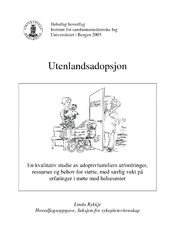| dc.contributor.author | Rykkje, Linda | en_US |
| dc.date.accessioned | 2006-08-03T11:40:42Z | |
| dc.date.available | 2006-08-03T11:40:42Z | |
| dc.date.issued | 2003 | eng |
| dc.identifier.isbn | 82-8088-237-5 (electronic version) | en_US |
| dc.identifier.uri | https://hdl.handle.net/1956/1565 | |
| dc.description.abstract | This study is about intercountry adoptions in Norway. The purpose of the study is to bring to light a diverse picture of the adoptive families’ particular challenges and resources. The study also focuses on how adoptive families describe and assess their meetings with the helping professions, - in particular with the public health (p. h.) nurse services. The study furthermore explores the adoptive families’ need for support both before and after the adoption takes place, and evaluates existing post-adoption follow-up services and pre-adoption courses for adoption applicants. The qualitative research interview is used as methodical approach. Nine couples of adoptive parents and four adoptive mothers, three p. h. nurses and four adult adoptees have been interviewed. The study’s results indicate that most of the adoptive families manage the “most common” challenges, and that these challenges diminish after time as parents and children adjust and attach to each other. However, the informants also tell about need for professional support and assistance in many cases. Recurring themes in the study are challenges linked to “attachment difficulties”, “external categorisation”, “grief” and “the meaning of biological heritage and roots”. The findings indicate that there is substantial demand for increasing the knowledge of adoptive families special needs not at least in the p. h. nurse services, but there are also indications of limited knowledge within the other helping professions adoptive families meet. The study suggests that the adoptive parents establish early contact with the maternity and child health centre, and propose that the p. h. nurse on routine basis offers adoptive parents a home visit before the adoptive child arrives. The study also indicates need of improving followup after adoptions, and suggests establishing a special follow-up program for adoptive families at the maternity and child health centre. The p. h. nurses should also more actively support adoptees in their teenage years through individual consultations. As a supplement to the school health services and youth health centre, associations for adopted youth and adults can be of valuable support for adoptees who need to share their experiences with someone. | en_US |
| dc.description.abstract | Tema for studien er utenlandsadopsjon i Norge. Studiens formål er å gi et variert bilde av adoptivfamiliers spesielle utfordringer og ressurser, samt deres møte med hjelpeapparatet, - i første rekke helsesøstervirksomheten. Studien belyser hvordan adoptivfamilier oppfatter behovet for informasjon og støtte både før og etter adopsjonen, samt ser på eksisterende etteradopsjonstilbud og adopsjonsforberedende kurs. Det kvalitative forskningsintervjuet er brukt som metodisk tilnærmingsform. Det er gjort samtaler med ni adoptivforeldrepar og fire adoptivmødre, tre helsesøstre og fire voksne adopterte. Resultatene i studien indikerer at de fleste adoptivfamilier mestrer de ”vanligste” utfordringene, og at det ”går seg til” etter hvert som foreldre og barn tilpasser seg og knyttes til hverandre. Informantene forteller imidlertid at det samtidig er behov for støtte fra hjelpeapparatet i mange tilfeller. Utfordringer som særlig går igjen i intervjuene er knyttet til temaene ”tilknytningsvansker”, ”ekstern kategorisering”, ”sorg” og ”biologiens betydning”. Funnene tyder på at det er et stort behov for økt kunnskap om adoptivfamiliers spesielle behov i helsesøstertjenesten, men det er også manglende kunnskaper i det øvrige hjelpeapparatet adoptivfamilier møter. Studien anbefaler at det tidlig opprettes kontakt mellom adoptivforeldre og helsestasjonen, og det blir foreslått at helsesøster tilbyr hjemmebesøk i forkant av at adoptivforeldrene har hentet barna i utlandet. Studien antyder også behov for å bedre oppfølgingen av adoptivfamilier ved å opprette et eget oppfølgingsprogram på helsestasjonen, samt at helsesøster har samtaler med adopterte i ungdomstiden. Som et supplement til skolehelsetjenesten og helsestasjon for ungdom, kan foreninger for adopterte ungdommer og voksne være en god støtte for adopterte som ønsker noen å dele sine erfaringer med. | en_US |
| dc.format.extent | 1606681 bytes | eng |
| dc.format.mimetype | application/pdf | eng |
| dc.language.iso | nob | eng |
| dc.publisher | The University of Bergen | eng |
| dc.title | Utenlandsadopsjon : en kvalitativ studie av adoptivfamiliers utfordringer, ressurser og behov for støtte, med særlig vekt på erfaringer i møte med helsesøster | en_US |
| dc.type | Master thesis | |
| dc.rights.holder | Copyright the author. All rights reserved | |
| dc.rights.holder | The author | |
| dc.subject.nsi | VDP::Medisinske Fag: 700::Helsefag: 800::Sykepleievitenskap: 808 | nob |
